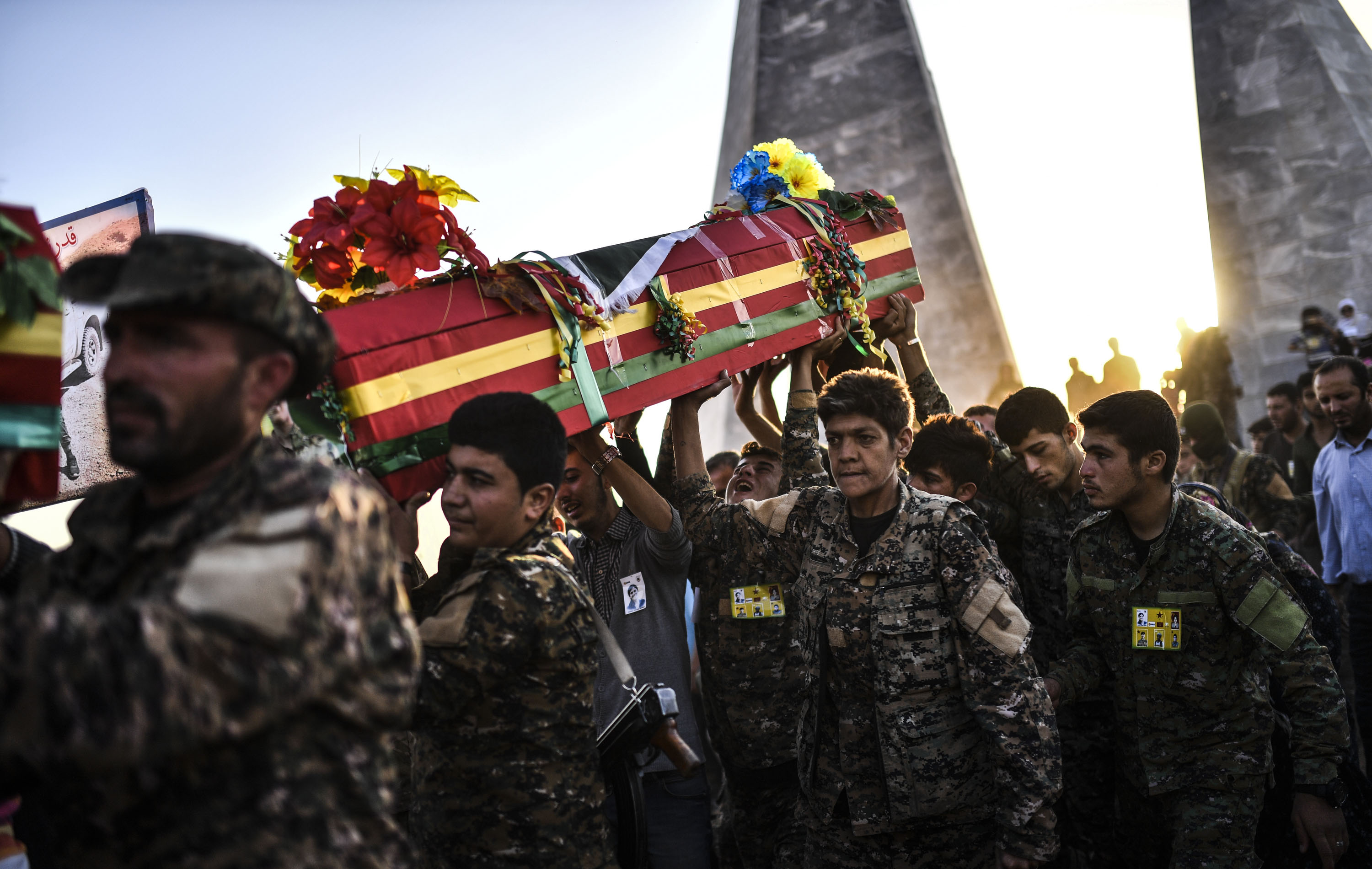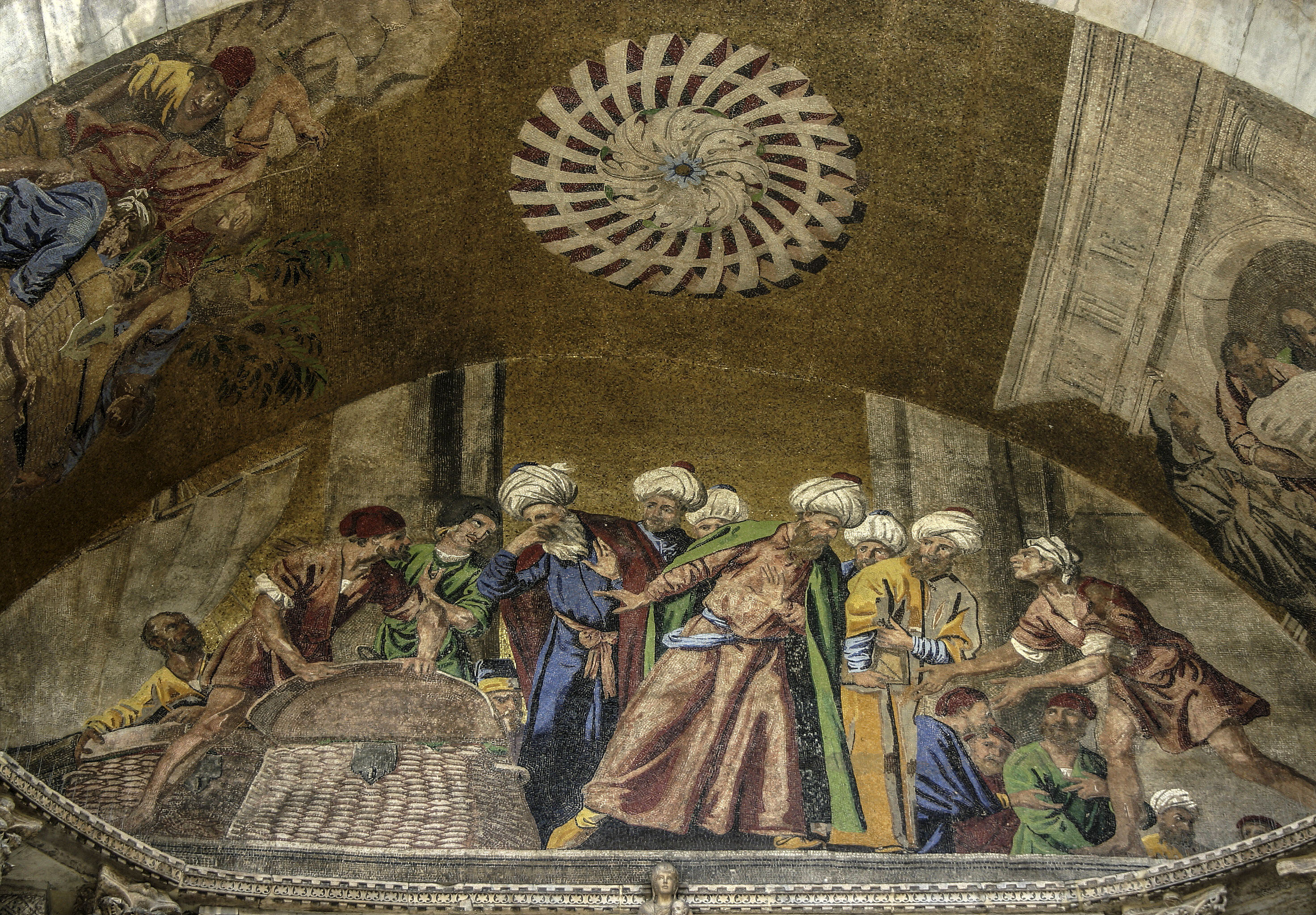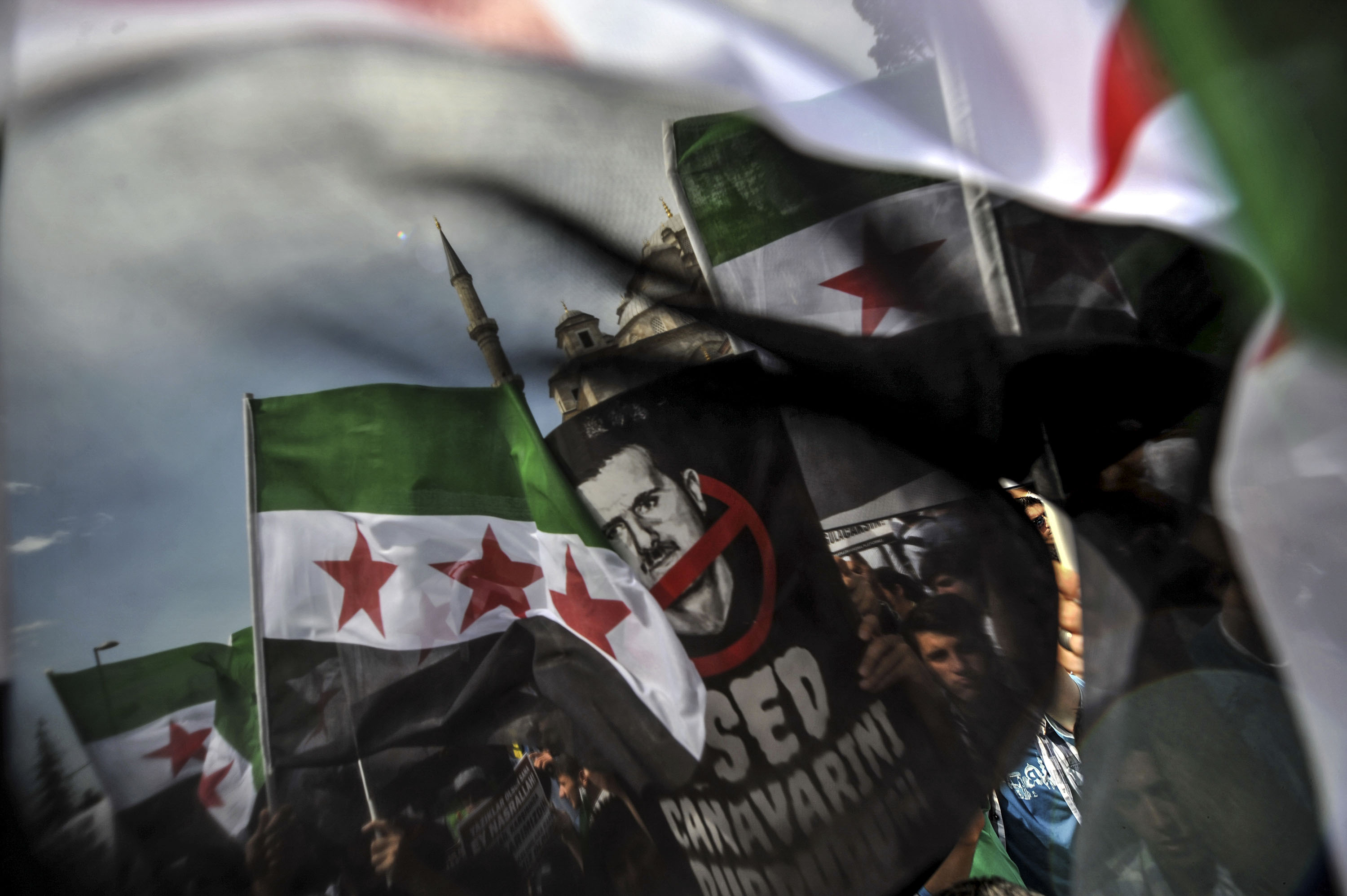The Syrian town of Kobani was destroyed in fighting between Islamic State militants and Kurdish groups. (Halil Fidan/Anadolu Agency/Getty Images)
COMMENT
After the Turkish attack along the Syrian borders against the Syrian Democratic Forces (SDF), there was an international reaction against Turkey’s President Recip Erdogan and calls for the war against the Kurds to end.
In my country, Italy, many leftist groups called for saving Rojava’s model of democratic and libertarian municipalism. Protest events were posted on Facebook and the newspaper La Republica ran for days an appeal signed by several intellectuals headed by writer Roberto Saviano, urging that the massacre of the Kurdish people be stopped.
This Turkish military operation is a political disaster not only because it has added other crimes and victims to the Syrian civil war, but also because it gives Damascus’s brutal regime, with the backing of Russia, the opportunity to seize control of large parts of Syria’s northeast, ending the de facto Kurdish self-government rule. Another gift to authoritarian rulers from isolationist, selfish and democracy-indifferent United States President Donald Trump.
I was confused and found disturbing this sudden surge of internationalism. Nothing of this kind has been happening in the last two to three years when Syrian President Bashar al-Assad’s forces and its allies Russia and Iran were destroying the towns where free municipalities were established after the 2011 Syrian revolution, bombing hospitals, schools, markets and residential districts.
 Geopolitics: The Kurdish People’s Protection Units, part of the Syrian Democratic Forces, fought Islamic State. Now Turkey is attacking them. (Bulent Kilic/AFP)
Geopolitics: The Kurdish People’s Protection Units, part of the Syrian Democratic Forces, fought Islamic State. Now Turkey is attacking them. (Bulent Kilic/AFP)
Silence, complete silence. Apart from the voices of a once upon a time anti-imperialist dogma, or the sympathy for Rojava’s dream of a matriarchal society, or again the Pavlovian conditioning of reacting against all what comes from the West and Nato’s forces (Turkey is still a Nato member), I was intensively taken by such a question: Why are the Kurds moving our hearts, and the Arabs are not?
The Moors are coming!
Certainly, because Kurdish women have played an important role in contemporary Kurdish society and politics, and they represent an international flag for women’s rights movements. Probably also because Kurds are not associated with Islam (although most of them are Muslims), veiled women or traditional tribal rules. Probably again, because Arabs struggling for their self-determination and finding their drive in their Muslim heritage are seen with mistrust. Again, the historical fear of the Moors, i Mori in Italian.
Europeans of the Middle Ages and the early modern period variously applied that name to Arabs, North African Amazigh, and Muslim Europeans. The term has been used in Europe in a broader, somewhat derogatory sense to refer to Muslims in general. And today, the more you look like a Muslim person according to our narrow paradigms, the less you deserve empathy from our fellow citizens.
 A mosaic in Saint Mark Cathedral in Venice reflects prejudice against Arabs. (Sebastian Backhaus/NurPhoto/Getty Images)
A mosaic in Saint Mark Cathedral in Venice reflects prejudice against Arabs. (Sebastian Backhaus/NurPhoto/Getty Images)
I have been asking myself: Why has nobody called for a massive mobilisation against the dirty war in Yemen, the largest humanitarian crisis in the world as the United Nations Children’s Fund has described it? Or against the systematic ethnic cleansing of Muslim Rohingya by the Burmese regime, among mass killings, sexual violence and widespread arson? Or against the Chinese concentration camps that have been operated by the Xinjiang Uyghur Autonomous Regional government for the purpose of interning Uyghur Muslims since 2014?
If you go to Venice, please visit the Saint Mark Cathedral. On the right side of its façade, you will notice a frescoed bezel representing the tricky theft of Saint Mark’s remains by Venetian merchants in Alexandria, when they hid the holy loot in the bottom of a barrel containing pork meat. While the merchants are dressed in fine clothes, the Arab customs officials have unformed beards and make comic faces. This representation still shapes our prejudices and feelings.
The worst is yet to come
Syrians know well that the return of Assad’s rule in northeast Syria means total oppression and punishment for people who have opposed him. Journalists and activists, many of whom resisted Islamic State and its ideology at huge personal risk, will face detention and disappearance in Assad’s torture dungeons. Civil society groups that have received US and European support are particularly at risk, and the West has a responsibility to ensure they’re protected.
 Betrayal: Turkish protesters wave Free Syria’s flags in 2013. (Ozan Kose/AFP)
Betrayal: Turkish protesters wave Free Syria’s flags in 2013. (Ozan Kose/AFP)
Unfortunately, the US has considered the Kurds an instrumental ally. Kurds have always been betrayed, by the West and by Russia, and the problem, according to analyst Salam Kawakibi, is that the dominant Kurdish party PYD (Democratic Union Party), the only one with strong armed militias out of 16 Kurdish parties in the area, has brought the Syrian Kurdish people to embrace shortsighted alliances to pursue their own political ambitions, thus exposing all Kurds to risky geopolitical games. And now the Kurdish-led SDF, which decided to turn to Damascus for protection, will pay a price for that.
The Syrian regime’s policies of discrimination and co-option vis-à-vis the Kurds will continue, as history teaches us. Between 1972 and 1977, a policy of colonisation was implemented by Damascus’s regime in specific regions populated dominantly by the Kurdish population. About 25 000 “Arab” peasants, whose lands were flooded by the construction of the Tabqa Dam, were sent in the High Jazirah and established in “modern villages” close to Kurdish villages. Something very similar to the Italianisation policy carried out by Mussolini in predominantly German-speaking South Tyrol.
Likewise, Damascus’s regime developed a policy to co-opt certain segments of Kurdish society and to serve foreign policy objectives. Co-option included some Kurdish political parties, and the PKK (Kurdistan Workers’ Party) was, for instance, authorised to recruit members and fighters, reaching between 5 000 and 10 000 people in the 1990s and to launch military operations from Syria against the Turkish army — all of that in exchange for the abstention of the Kurdish movements of Iraq and Turkey from attempting to mobilise Syrian Kurds against the Syrian regime.
Nevertheless, later Kurdish uprisings were repressed, such as the 2004 uprising in the town of Qamishly, or the 2011 Arab Spring protests in several northeastern Syrian towns. That is why it is likely that, as the Assad regime strengthens its position by conquering new territories and deploying its troops in earlier SDF-controlled towns, it once again turns its forces against the Kurdish regions and, with the agreement and support of regional and international actors, prevents any form of autonomy in Kurdish inhabited regions.
What to expect from Assad
One should read a freshly published report to understand how far such a regime has been scorning the basic human rights of its citizens, even once they have returned home. The reality behind Assad’s promises to displaced Syrians — an unprecedented effort to gather testimonies from people who have returned to Assad-held areas (mostly because of dire living conditions in the displacement locations or because they believed the regime’s promises of safe return) and those who remained in formerly opposition-controlled areas after they were retaken by regime forces under so-called reconciliation agreements — tells of a policy of demographic change aimed at stripping a huge portion of the displaced Syrians of their homes and properties through discriminatory laws, demolitions and false reconstruction activities, as well as of collective punishment through arrests, corruption and extortion. The numbers speak best:
• 62% of respondents or one of their relatives were arbitrarily detained by the regime’s security services;
• Forced conscription into Assad’s forces is rampant, especially in areas integrated under “reconciliation agreements”, where up to 75% of those interviewed or their family members were wanted for recruitment. Conscripted fighters are almost inevitably sent to the most dangerous front lines;
• 64% of all those who were forced to leave their home, or had left areas that were later retaken by the regime, had to pay for non-existent services for all periods when these areas were out of its control, or when the returnees were out of the area;
• Two-thirds of the interviewees stated that they live in constant fear of arrest or harassment from the security services and various militias; and
• Most returnees are systematically denied the right to their property in an openly retaliatory manner, especially in areas where the regime has seized control by force, as regime officials know that one of the key reasons they returned was to officially document their property to ensure it is not lost.
Well, one should not expect something different in areas formerly run by Kurdish-led SDF forces, once their self-government rule has vanished.
Putinism and the 1930s return
Those who compare the Syrian civil war with the Spanish Civil War of the 1930 are tremendously right. Former Le Monde director Natalie Nougayrède writes: “Western and European defeat in Syria (by which I mean political and moral, not just military defeat) has parallels with the 1930s when democracies were unable or unwilling to stand up to authoritarians when it mattered, or even to play any kind of meaningful role in preventing a catastrophe that would soon enough engulf them, too.”
How the strongmen of authoritarian regimes (Russia, Iran, Turkey, Saudi Arabia …) have been able to carve a major new geopolitical area of influence in the Middle East is not the point at this stage when Syrian people have lost everything and Damascus’s clan, one of the most sanguinary dictatorships ever, has been rescued and relegitimised. The point is that they have proved that liberal democracy can be isolated, contained and deconstructed, and their model for nationalism and expansion based on brute force can become the leading political stream of this century.
 Kurdish-led force expelled Islamic State from the northern Syrian city of Raqa. (Bulent Kilic/AFP)
Kurdish-led force expelled Islamic State from the northern Syrian city of Raqa. (Bulent Kilic/AFP)
They are proving to be able to offer an alternative to the doctrine of liberal values, democratic rule and human rights. In a world of fear, technocracy, ecological collapse, fragmentation and disinformation, the authoritarians are offering stability through identitarianism, militarisation, scapegoating, order and annihilation of dissent, without renouncing the benefits of rampant capitalism and the control of natural resources.
Is that the world order we want our children to grow up in? It is as if the cradle of fascism moved further to the East, from the geographical triangle including Spain, Italy and Germany to the bloody alliance between Russia, Iran and Syria, with the complicity of other regional powers, who prefer neighbouring repressive governments to the popular free expression of self-determination.
The level of crimes perpetrated in the name of the raison d’état in these years in that part of the world is so profound and has been so effective but tolerated that crime has became a legitimate practice to hold power. The Egyptian security apparatus, the war in Yemen, the shrinking space for civil society in many countries, Crimea’s annexation, the persecution of Muslims in Asia, or the return of systematic killings by police forces or their protégés in Brazil and Central America, all these developments feel legitimated by the new doctrine.
And Europe, which has been passively suffering all the dramatic consequences of the “Syrian dis-order”, from large-scale terror attacks to the dramatic wave of refugees, is facing local emboldened nationalist, illiberal or fascist parties who praise Moscow, Damascus, Cairo, Abu Dhabi or Riyadh.
And a coalition between those illiberal states and European parties such as Germany’s Alternative für Deutschland, France’s Front National or Italy’s Lega Nord is no longer science fiction: financial support, common discourse (with the formal exception of the anti-Islam narrative) and courtesy visits are a daily reality.
One of Russian President Vladimir Putin’s aides describes this doctrine as “Putinism” and he believes it to be the ideology of the future; to be for the 21st century what Leninism was for the 20th.
Is everything lost?
Not everything is lost, and we should read the signs of popular resilience to this damn obsession of domination, which is driving humans insane. First, Germany has charged two alleged former Syrian secret service officers — who had entered Europe as asylum seekers — with crimes against humanity. In 2020, in Germany there could be the first process ever on crimes committed in the current Syrian civil war, thus breaking the impunity of which the Syrian regime has benefited so far.
The amazing side of the story is that substantial evidence against the men was gathered as a result of the exhibition of so-called “Caesar’s” photographs in the UN headquarters in New York in March 2015, which depicted the corpses of thousands of torture victims alongside personal testimonies. The photographs were taken by a former member of the Syrian military police calling himself Caesar, who fled Syria with the images in 2013. In 2017, I had the honour to co-organise the hosting of the exhibition in the city of Florence.
Second, history is not made of heroes (and criminals) only. It is also made of people, and Arab peoples have recently shown an extraordinary capacity to surprise the world and stand for self-determination, rights and justice, despite the counter-revolutionary restoration that took place after 2011.
On the 65th anniversary of the start of Algeria’s war for independence from France, Algiers hosted the 37th mass demonstration since its pro-democracy movement began last February. After having overthrown dictator Omar al-Bashir, the Sudanese revolution was able in August to lay down a transition roadmap, despite the machinery of the state’s military and the tribal divides. Last September, the first significant protests erupted in Egyptian cities since former army chief Abdel Fatah al-Sisi came to power; the security reacted promptly and more than 2 000 people were detained. But the situation is fluid, and the regime fears people’s frustration.
Since October 17, the streets of Lebanon have been jammed with protesters — the biggest anti-government demonstrations in 15 years. The protests were triggered by talk of a new tax on WhatsApp and other internet call services, and enlarged their focus on the general corruption of the political class and the dominating sectarianism, leading to the resignation of prime minister Saad Hariri.
Bagdad’s Tahrir Square has been the theatre of continuous protests since October 1 against years of corruption, unemployment and inefficient public services, with calls to overthrow the administration and stop the Iranian intervention in Iraq. The police force’s repression has been brutal causing hundreds of casualties, but the movement has not given up and keeps its multi-confessional and cross-sectoral nature.
I wonder whether strongmen in the region are realising that their authority will not last forever.
If there is a lesson to be drawn from these moments, it is one of united destinies. Our destinies are linked, as Europeans who are concerned about the health of their democracy and homegrown illiberalism, and as Arabs (or Kurds) standing for more open societies, social justice and governmental accountability.
Despotic and authoritarian regimes learn from their experiences in repression and share them with their allies. Democratic forces and movements need to do the same. The West failed to embrace the generation of the Arab Spring.
A double failure would be the end of our space of freedom as we have lived it until now.
This is an edited version of an article that was first published on the Open Democracy website. Gianluca Solera was a co-founder of the first Italian Green political platforms. At the Anna Lindh Foundation for the Dialogue Between Cultures, he built a network of 4 000 organisations from 40 countries in Europe, the Arab world, Israel and Turkey. He is the author of several books, among them Walls, Tears and Za’tar and A Mediterranean Awakening. He is a member of the Mediterranean Citizens’ Assembly, which promotes dialogue between cultures